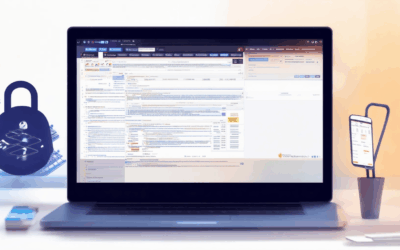In today’s interconnected world, secure internet usage has become more than just a precaution—it’s a necessity. As we navigate through the digital landscape, ensuring safe online activity is no longer optional but a critical part of our daily lives. Whether it’s protecting sensitive personal information, safeguarding professional communications, or simply browsing the web confidently, understanding and implementing secure internet practices are vital. This guide delves into the best practices for securing your data online, equipping you with the knowledge to stay protected in an ever-evolving digital environment. From strengthening passwords to leveraging advanced security tools, we’ll explore everything you need to know to enjoy a secure internet experience. Stay informed, stay vigilant, and embrace the power of safe online interactions.
Key Takeaways
- Use Strong, Unique Passwords: Create complex passwords with mixed characters and avoid reuse to enhance account security.
- Enable Firewall Protection: Activate built-in firewalls to safeguard your devices from unauthorized access.
- Regularly Update Software: Keep all systems and applications current to protect against vulnerabilities.
- Exercise Caution with Public Wi-Fi: Limit sensitive activities and use a VPN when accessing public networks.
- Implement Two-Factor Authentication (2FA): Add an extra security layer for critical accounts like email and social media.
- Encrypt Sensitive Data: Secure files on local drives and cloud storage to prevent unauthorized access.
- Spot and Avoid Phishing Scams: Verify email sources and be cautious of suspicious links to protect your information.
- Adopt HTTPS Whenever Possible: Use encrypted connections to ensure data transmission safety.
- Backup Data Frequently: Regularly save important files to mitigate risks of data loss.
- Stay Informed and Educate Others: Keep updated on cybersecurity threats and share awareness to foster safer online habits.

How Can I Ensure Secure Internet Usage?
Ensuring secure internet usage involves adopting several key practices to protect your online identity and data. Here’s a step-by-step guide to help you stay safe:
- Use Strong Passwords:** Create complex passwords with a mix of letters, numbers, and symbols. Avoid reusing passwords across multiple accounts.
- Enable Two-Factor Authentication (2FA):** Add an extra layer of security by verifying your identity through a second method, such as a unique code sent to your phone or an authenticator app.
- Regular Software Updates:** Keep your operating system, browsers, and apps updated to patch vulnerabilities that hackers could exploit.
- Avoid Risky Public Wi-Fi:** Use your mobile data or a VPN when connecting to public networks to prevent unauthorized access to your devices.
- Spot Phishing Attempts:** Be cautious of suspicious emails, messages, or websites asking for personal information. Verify the authenticity of links before clicking.
Additional Security Measures
For added protection, consider these tips:
- Encrypt Your Data:** Use end-to-end encryption for sensitive files stored in cloud services or shared via email.
- HTTPS Everywhere:** Ensure websites you visit use HTTPS to encrypt data transmission between your browser and the site.
- Secure Payment Gateways:** Stick to trusted payment platforms that use secure checkout processes and encryption.
Tools and Resources
To further enhance your online security, utilize the following tools and resources:
- NordVPN:** A popular VPN service offering advanced encryption and secure browsing.
- ExpressVPN:** Another reliable VPN provider with robust security features.
- BlindBrowser Guides : Access detailed guides on online privacy and security.
By following these steps, you can significantly reduce your risk of exposure to cyber threats and ensure safer internet usage. Stay vigilant and regularly review your security settings to maintain optimal protection.
Effective Ways to Secure Your Data While Using the Internet
Securing your data online is essential to protect your personal information and maintain privacy. Here are proven strategies to safeguard your information while browsing the web:
- Use Strong, Unique Passwords:** We recommend creating complex passwords for every account. Combine letters, numbers, and symbols to make them hard to guess. Avoid reusing passwords across multiple platforms.
- Enable Two-Factor Authentication (2FA):** Add an extra layer of security by enabling 2FA for your accounts. This requires a second form of verification, often a code sent to your phone, to access your account.
- Regular Software Updates:** Keep your operating system, apps, and browsers updated. These updates often patch security vulnerabilities that hackers could exploit.
- Avoid Suspicious Links:** Don’t click on links from unknown sources, especially in emails or messages. Hover over links to see the URL and verify its legitimacy before clicking.
- Be Cautious on Public Wi-Fi:** Public Wi-Fi networks may not be secure. Use a VPN when connecting to free or shared networks to encrypt your data and prevent unauthorized access.
- Encrypt Your Data:** Use encryption tools to protect files and communications. Encryption helps keep your information confidential, especially when sharing sensitive data online.
- Spot Phishing Attempts:** Look out for fake emails, websites, or messages pretending to be from trusted companies. Verify the sender’s identity before taking any actions.
- Enable Private Browsing:** Use features like Incognito Mode or Private Browsing to avoid leaving a trail of your online activity, reducing the risk of tracking cookies.
- Secure Your Accounts:** Enable account security features like biometric authentication or app-based login to add an extra barrier against unauthorized access.
By following these steps, you can significantly reduce the risk of data breaches and enhance your online security. Remember to stay vigilant and regularly review your security settings to stay protected.

Best Practices for Securing Internet Usage
Securing your internet usage is essential to protect your personal information and maintain your digital privacy. Here are some proven strategies to enhance your online security:
- Use Strong Passwords:** We recommend creating complex passwords with a minimum length of 12 characters, combining letters, numbers, and symbols. Avoid reusing passwords across multiple platforms.
- Enable Two-Factor Authentication (2FA):** Add an extra layer of security to your accounts by enabling 2FA. This requires a second form of verification, such as a code sent to your phone or via an authenticator app.
- Regularly Update Software:** Keep your operating systems, browsers, and apps updated to patch vulnerabilities that hackers might exploit. Outdated software is often an easy target for cyberattacks.
- Encrypt Your Data:** Use end-to-end encryption for sensitive information stored online. This ensures that only the intended recipient can access your data, preventing unauthorized access.
- Browse Safely Using Private Browsers:** Consider using browsers designed with privacy in mind, such as BlindBrowser , which prioritizes user privacy and security.
- Avoid Public Wi-Fi Unconditionally:** Public Wi-Fi networks are often unsecured, making them prime targets for cybercriminals. Stick to trusted networks or use a VPN when connecting to public hotspots.
- Be Cautious of Phishing Attacks:** Recognize and avoid suspicious emails, messages, or links. Verify the sender’s identity before interacting with any unknown communications.
- Install Antivirus Software:** Use reputable antivirus programs to detect and remove malicious software from your devices. These tools also provide real-time protection against threats.
Additional Tips:
- Use a VPN for Added Privacy:** A Virtual Private Network (VPN) encrypts your internet traffic, making it difficult for third parties to intercept. This is particularly useful when accessing public Wi-Fi or sharing sensitive information online.
- Encrypt Your Devices:** Enable encryption for your hard drives, SSDs, and external storage devices to safeguard your data in case of theft or loss.
- Monitor Your Online Accounts:** Regularly check your account settings to ensure your personal information is accurate and update your password whenever you suspect it has been compromised.
By following these best practices, you can significantly reduce your risk of falling victim to cyberattacks and ensure greater peace of mind while browsing the internet. Remember, staying informed and proactive is the key to maintaining a secure online presence.

What Are the Best Ways to Ensure Secure Internet Usage?
Here are the top strategies to enhance your online security:
- Use Strong Passwords : Create complex passwords with a mix of letters, numbers, and symbols. Avoid reusing passwords across multiple accounts. [1]
- Enable Firewall Protection : Activate built-in firewalls on your devices to block unauthorized access and monitor network traffic. [2]
- Regular Software Updates : Keep all software, including operating systems and apps, up to date to patch security vulnerabilities. [3]
- Be Cautious With Public Wi-Fi : Limit sensitive activities like banking on public networks and use a VPN for added protection. [4]
- Two-Factor Authentication (2FA) : Add an extra layer of security by enabling 2FA for your accounts, especially for critical ones like email and social media. [5]
- Encrypt Your Data : Use encryption for sensitive files stored on local drives or cloud storage services. [6]
- Avoid Phishing Scams : Stay vigilant against phishing attempts by verifying the authenticity of emails, messages, and websites before sharing personal information. [7]
- Use HTTPS : Ensure websites you visit use HTTPS (the padlock icon in the URL bar) to encrypt data transmission. [8]
- Back Up Data Regularly : Create regular backups of important files to restore them in case of data loss due to malware or hardware failure. [9]
- Educate Yourself and Others : Stay informed about the latest cybersecurity threats and share awareness with family and friends to promote safer online habits. [10]
By following these steps, you can significantly reduce your risk of security breaches and enjoy a safer online experience.
[1] BlindBrowser.com – Password Management Guide
[2] BlindBrowser.com – Network Security Tools
[3] BlindBrowser.com – Software Update Best Practices
[4] BlindBrowser.com – Public Wi-Fi Safety
[5] BlindBrowser.com – Two-Factor Authentication
[6] BlindBrowser.com – Data Encryption Methods
[7] BlindBrowser.com – Phishing Awareness
[8] BlindBrowser.com – HTTPS Importance
[9] BlindBrowser.com – Data Backup Solutions
[10] BlindBrowser.com – Cybersecurity Education
What Are the Best Ways to Ensure Secure Internet Usage?
Here are the top strategies to enhance your online security:
- Use Strong Passwords : Create complex passwords with a mix of letters, numbers, and symbols. Avoid reusing passwords across multiple accounts. [1]
- Enable Firewall Protection : Activate built-in firewalls on your devices to block unauthorized access and monitor network traffic. [2]
- Regular Software Updates : Keep all software, including operating systems and apps, up to date to patch security vulnerabilities. [3]
- Be Cautious With Public Wi-Fi : Limit sensitive activities like banking on public networks and use a VPN for added protection. [4]
- Two-Factor Authentication (2FA) : Add an extra layer of security by enabling 2FA for your accounts, especially for critical ones like email and social media. [5]
- Encrypt Your Data : Use encryption for sensitive files stored on local drives or cloud storage services. [6]
- Avoid Phishing Scams : Stay vigilant against phishing attempts by verifying the authenticity of emails, messages, and websites before sharing personal information. [7]
- Use HTTPS : Ensure websites you visit use HTTPS (the padlock icon in the URL bar) to encrypt data transmission. [8]
- Back Up Data Regularly : Create regular backups of important files to restore them in case of data loss due to malware or hardware failure. [9]
- Educate Yourself and Others : Stay informed about the latest cybersecurity threats and share awareness with family and friends to promote safer online habits. [10]
By following these steps, you can significantly reduce your risk of security breaches and enjoy a safer online experience.
[1] BlindBrowser.com – Password Management Guide
[2] BlindBrowser.com – Network Security Tools
[3] BlindBrowser.com – Software Update Best Practices
[4] BlindBrowser.com – Public Wi-Fi Safety
[5] BlindBrowser.com – Two-Factor Authentication
[6] BlindBrowser.com – Data Encryption Methods
[7] BlindBrowser.com – Phishing Awareness
[8] BlindBrowser.com – HTTPS Importance
[9] BlindBrowser.com – Data Backup Solutions
[10] BlindBrowser.com – Cybersecurity Education

What Are the Best Practices for Secure Internet Usage?
Here are the top practices to ensure safe and secure internet usage:
- Use Strong Passwords : Create complex passwords with a mix of letters, numbers, and symbols. Consider using a password manager to store and organize them securely.
- Enable Two-Factor Authentication (2FA) : Protect your accounts with an additional layer of security by enabling 2FA. This adds an extra step beyond just your password.
- Keep Software Updated : Regularly update your operating system, browsers, and apps to patch vulnerabilities that could expose your device to threats.
- Be Cautious with Public Wi-Fi : Avoid sensitive transactions (like banking) on public Wi-Fi. Use a VPN for added protection when connecting to unknown networks.
- Learn About Privacy Settings : Familiarize yourself with privacy settings on platforms and apps you use. Adjust them to limit data collection and sharing.
- Backup Data Regularly : Regular backups of important files can save you from losing data due to cyberattacks or hardware failures.
- Spot Phishing Attempts : Be vigilant about suspicious emails, messages, or links. Verify the sender before clicking on anything unfamiliar.
- Use Encrypted Communication : Opt for encrypted messaging services to ensure your conversations remain private.
- Monitor Accounts : Regularly check your accounts for unusual activity or unauthorized changes.
- Educate Yourself : Stay informed about the latest cybersecurity threats and trends to better protect yourself online.
For more resources, visit BlindBrowser and explore guides from trusted organizations like WhatIsPrivacy and The Internet Safety Hub .




